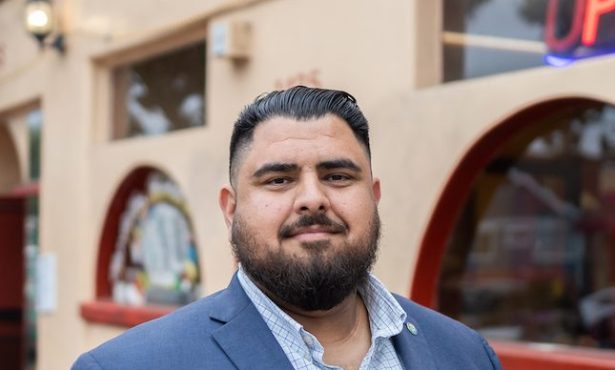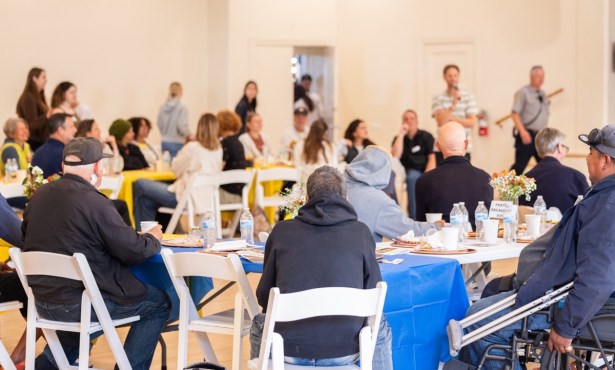Dog Star Rising
Chum Vests and Assisted Suicide Bill
LAST RIGHTS: It was deadline day, and I was slammed, but it was my next-door neighbor on the horn. He’s the neighbor everyone wishes they had, and if he calls — ever — you simply take it. He’d been seized by an idea how to re-brand suicide, though the idea of “re-branding” anything was precisely the sort of abomination that would never cross his mind, let alone pass his lips.

At the time, the state legislature was debating a medically assisted suicide bill sponsored by a former hospice social worker turned state pol named Susan Talamantes Eggman. Governor Jerry Brown had not yet signed the bill, and the chances of Eggman’s bill making it out of the legislature appeared remote in the extreme. Members of the predominantly Roman Catholic Latino caucus had gotten their arms twisted and ears bent by anyone wearing a collar. The Church wanted this bill killed. Like most people with any mileage on planet Earth, my neighbor had either done his own dance with a deadly disease or watched a loved one forced to foxtrot their way to the bitter end. “The language is all wrong,” he exclaimed of the rhetoric used by the bill’s proponents. “No one wants to hear about ‘assisted suicide.’ It’s a loser.”
His solution? Call it something else. His suggestion? “Call it ‘Youdecide,’” he said. “Or if you want to be hip, you can spell it ‘Udecide.’”
I chuckled, said something vapidly encouraging, and quickly found another call to take. But he was not to be fobbed off so easily. In his youth, he’d successfully led a group escape from a Mexican prison — all captured in a recent National Geographic documentary — their only digging tool being an old butter knife. Two days later, he was back, this time armed with a song he’d written for the new campaign. Among his many talents, my neighbor plays trumpet, keyboards, and bagpipes. As part of political propaganda campaign, he’d appropriated a crying-n-dying Louisiana swamp pop song that hit number one for two weeks in 1963, “I’m Leaving It Up to You,” by a duo that split up more than they stayed together named Dale and Grace. My neighbor, it turns out, also sings and left a rendition of the refurbished tune on my answering machine.
In subsequent weeks, I somehow found other things to write about. But I watched the debate over assisted suicide unfold both in Sacramento and in Santa Barbara. Assemblymember Das Williams — who opposed the bill on religious grounds — explained that proponents intentionally wrote the measure in such a way the legislature couldn’t pass it; the point all along, he said, was to put it to voters in 2016 as a statewide ballot initiative. Williams expressed reservations about language stipulating medical assistance would be rendered only if the patient had six months or less to live. Williams’s own grandfather, diagnosed with prostate cancer, had been given six months to live nearly five years ago. If the bill had been on the books, would Williams’s grandfather have pulled his rip cord prematurely?
Everyone has a story.
Even though polls showed assisted suicide had 70 percent approval ratings, proponents felt compelled to yank the bill to avoid certain legislative annihilation this summer. Williams took serious heat for his opposition and from people who’d long been happy cogs in his political machine. More than 50 of them showed up to demonstrate outside his downtown offices. Across town, State Senator Hannah-Beth Jackson made it clear she and Williams were poles apart; in 1999, during her first stint in Sacramento, Jackson pushed an assisted suicide bill of her own. When her mother was diagnosed with leukemia, she made it clear she didn’t want to die alone and she wanted to die with dignity. She wound up getting half her wish, but for Jackson, one out of two wasn’t good enough.
Everyone has their story.
One of my uncles, terminal cancer, got a mercy shove by a next-door neighbor who happened to be a doctor. His kids were grateful. A remote relative with terminal cancer shot himself in the head to escape the pain. Out of consideration for those cleaning up the mess, he went outside first. Even so, the mess was considerable. Another relative helped his father, stricken with Alzheimer’s, overdose. They’d made a pact before things got bad that if and when they did, the son would take action. Although charges would eventually be dropped, the son was charged with murder. That, too, proved to be a considerable mess.
Opponents worry assisted suicide will be used to pressure the sick and handicapped to take a long walk off a short pier by greedy relatives and insurance providers looking to cut costs. I get it. But the experience of Oregon, where assisted suicide has been legal since 1997, doesn’t bear such fears out. The vast majority who have availed themselves of medical assist there have been white, educated, affluent, and well into their seventies.
Ultimately the bill got to the governor’s desk during this year’s special session. Everyone agrees it took the ugliest political route imaginable. The governor made it abundantly clear he disapproved of the process. Still, he voted for the bill. “I do not know what I would do if I were dying in prolonged and excruciating pain,” wrote the former Jesuit seminarian. “I am certain, however, it would be a comfort to be able to consider the options afforded by the bill. And I wouldn’t deny that right to others.”
That’s good news for my next-door neighbor but bad news, it turns out, for local sharks. If the bill hadn’t passed, he had a backup plan to make a Velcro-encrusted vest and cover it with large bloody slabs of chum and other shark bait. The end, he acknowledged, might be violent and terrifying. But probably it would be fast. In the meantime, I can’t get that terrible song out of my head.



